
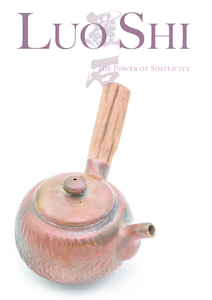 |
|
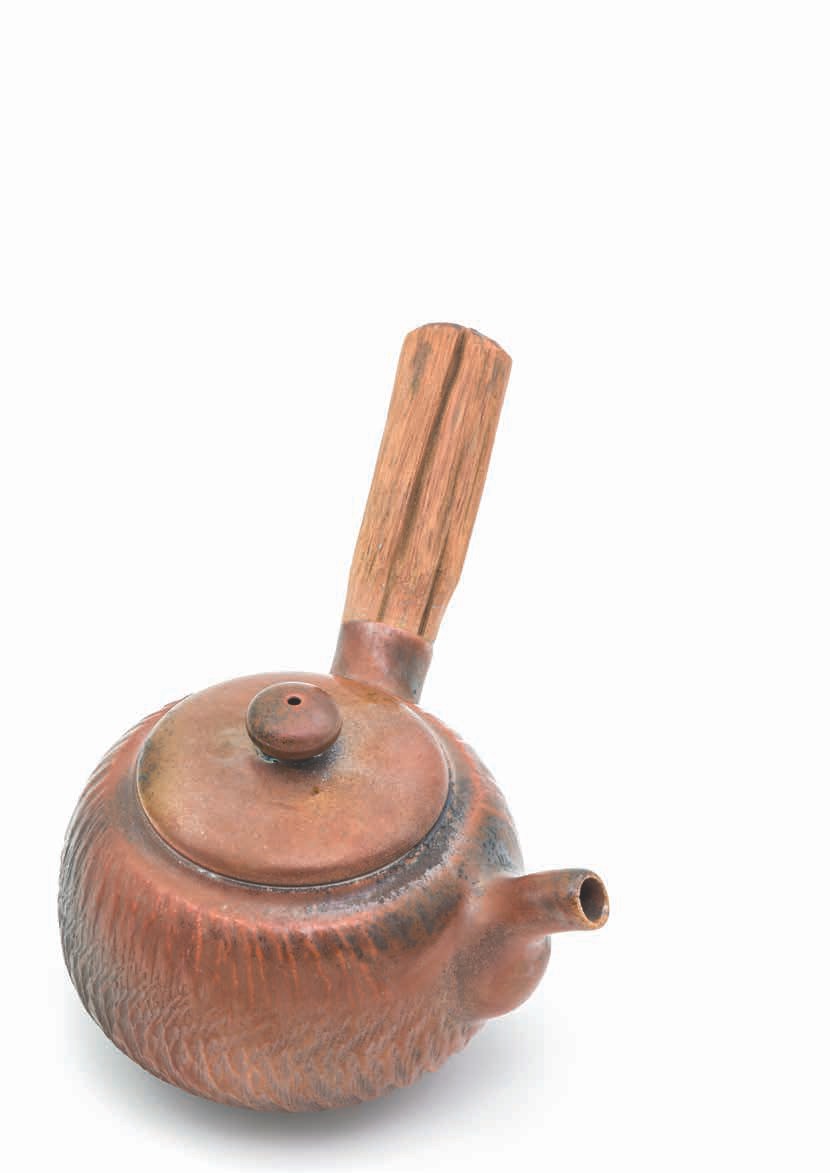
Luo Shi (羅石) is one of my oldest Taiwanese friends, dating back before we could even communicate - when all was tea and smiles, gestures and drawings. When I moved to Miaoli sixteen years ago, it was following Tea spirit to the place where She called me. I had tea friends here, and one of the most important teachers in my life, but I was always searching for new tea and teaware, as well as lessons to improve my understanding of tea and tea brewing. While driving my scooter home from teaching kindergarten one evening, I saw a small shop with a huge array of Yixing pots in the window and screeched to a halt. Back up - wait a minute... This shop was right down the street from my house! Why hadn't I seen it in the month I had been living here? With a smile, I pushed the door open, and I was greeted by a friendly smile that far outshone my own.
Drinking tea with Luo Shi, exchanging only names and smiles, I was impressed by his obvious knowledge of Yixing history, lore and craft, which was evidenced by the very decent collection of pots he had for sale in his shop. The best mines in Yixing were closed in the late 1990s, and many potters there turned to using ore from the inferior mines, like Fu Dong, which is still open today, or importing clay from other parts of Jiangsu or even further afield. But in the early 2000s, there were still a lot of great pots in Taiwan, though mostly in the hands of private collectors. The shops had all been picked clean, and a good pot was starting to become a rare sight, while truly great ones were starting to feel remote. Luo Shi's shop was, therefore, a welcome surprise, as there were quite a few affordable and very decent Yixing pots, and a few sparkling gems I noticed right away. Looking around at this, I decided to stay for tea. I remember noticing a table in the back with some potters' tools and clay, and thought that there was a lot to explore in this shop indeed!
My Yixing teacher, Master Zhou, has often told me that all throughout the 1980s, Yixing was kept alive by the Taiwanese, saying that every teapot maker in Yixing working at the time sold exclusively to Taiwanese collectors, and therefore owe them a debt of gratitude. Luo Shi was one such Taiwanese, opening his shop in the late 1980s to sell tea and Yixing teaware, which he loves. Over the next ten years, I and my guests would pick through Luo Shi's collection and take home all his great pots, some of which are still here in the Center. (There may be a few in this community as well.) After the first time we drank tea, I knew I had met a tea brother to last my time in Miaoli, which was destined to become my home. And, the good news is: now Luo Shi and I can actually communicate! Getting to know him has only endeared him to me more, as he is kind, generous and very talented. He also knows a lot about tea, teaware and ceramics. We are lucky to have such a teacher right around the corner from the Center.
Luo Shi was born in Nantou in 1959. He grew up in the mountains. His father was a fruit farmer, growing plums, peaches and pomelos. Luo Shi helped on the farm, working as hard as he played. He says he drank tea often as a boy, since all the adults would drink tea together whenever they had free time.
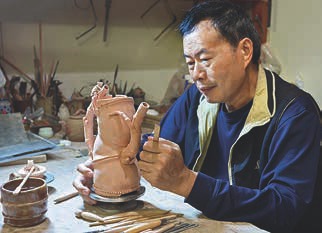
Luo Shi's mother is a Hakka from Miaoli, and he came to stay with family here when he was a young adult. Like many young people from the country, myself included, he sought a life in the city (though Miaoli is a very small city, perhaps a nice medium). Whatever the reason, Luo Shi's destiny was here in Miaoli. He soon met his wife and decided to settle down here for good, opening a restaurant to support himself.
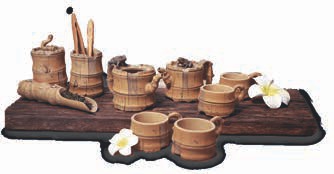
In the 1980s, Luo Shi's brother took over the family farm in Nantou and switched from fruit farming to tea, as the tea boom was beginning all over Taiwan. Luo Shi started selling his brother's tea in the restaurant. He loved sharing it with customers, and so, as the tea started to sell more and more, he made the decision to open a tea store. Around the same time, the Yixing teapot craze was spreading all over the island, and Luo Shi fell in love with Yixing teaware, collecting all he could. His little shop soon became as filled with teapots as it was with tea grown on his family farm.
Then, in 1992, Luo Shi's life changed forever. He met his teacher, Tang Run Qing (湯潤清). Master Tang is one of a few rare Taiwanese teaware makers who actually works with authentic Yixing clay. In the 1980s, as all the teapots started crossing the Strait to be sold to the growing teapot market in Taiwan, some ore and clay also started making its way over. Many potters used local clays of similar colors to Yixing to make wheelthrown replicas, a trend that continues today. However, a few talented potters, like Master Tang, studied under Yixing craftsmen and began making slab-built pots in the traditional styles. Master Tang eventually evolved his own style of making teapots. He based his work on traditional Yixing Nature-themed pottery. He liked the pots in the shape of gourds, pumpkins, bamboo, insects and other wildlife, designing his own take on this kind of pot. Luo Shi was drawn to this pottery, as it reminded him of Nantou, where he grew up running in the mountains and playing with bamboo and insects. He followed in Master Tang's footsteps, taking classes a few times a week, collecting genuine Yixing clay and hand-building teapots.
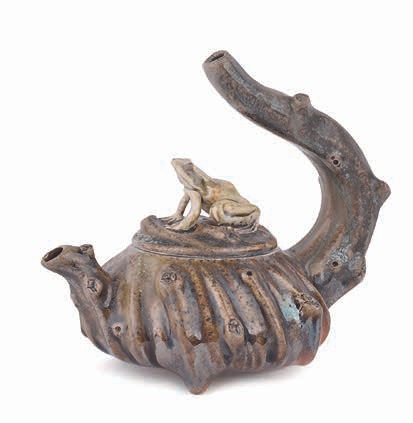
By the time I met Luo Shi, he had already been making Yixing pots for more than ten years, and many of the gorgeous, artistic pieces on the top shelves were his own. The workshop in the back of his tea store, I later came to find out, was where he hand-built Yixing teapots. The first time I went back there, all the Yixing ore and clay amazed me, as I had never seen so much outside of Yixing itself. Luo Shi became well known for creating very realistic bamboo pots, often with insects adorning various parts of the pot. While Master Tang continues to walk down a path of Nature-themed pots hand-built from Yixing clay, Luo Shi got permission from his teacher to take another turn in 2007.
The growing rarity and scarcity of genuine Yixing clay, as well as meeting other potters, inspired Luo Shi to try his hand at the wheel. Throughout the early 2000s, he started taking classes to deepen his understanding of ceramics in general, firing and glazing and using a potter's wheel. His years of experience working with Yixing clay, sculpting gorgeous works of art, meant he learned quickly. By the end of 2007, he had started developing a style all his own.
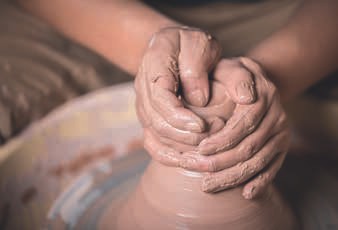
Luo Shi began using local Miaoli clay to craft teapots, sinks, jars and many other pieces on the wheel. He very quickly fell in love with wood-firing, especially the unpredictability and the harmony with Nature, which he has loved his whole life. This was yet another way for him to express Nature through ceramics: using clay from his home and then firing with wood in the mountains nearby. He loves firing every couple of months, spending the night in the mountains, watching the kiln. He told me that the uniqueness of each and every piece makes them very special. "The fire is as much the artist as I am."
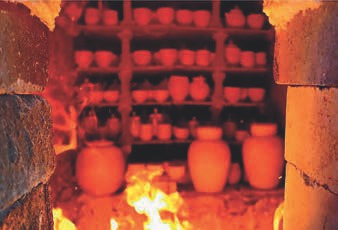
The clay in Miaoli has a very high iron content, which makes for great teaware, providing a sweetness to the tea. It also reacts with the fire and ash to make gorgeous, shining, sunset-like patterns across his pots. Luo Shi fires every two months. It takes four days (96 hours) to complete a single firing. A tremendous amount of effort, time and love is put into getting the kiln up to around 1230 °C. Wood-firing was a natural step for someone raised in the mountains, and with such a passion for the natural form.
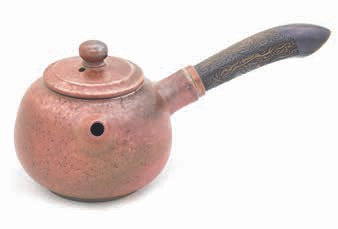
At some point, Luo Shi joined the growing trend of making sidehandle pots using wooden handles. The style suits him, and he has done things with it that no other has. He loves hiking in the mountains around Miaoli to find pieces of wood for his pots, and the door outside his shop is lined with baskets full of various vines, branches and other pieces of wood. More recently, he has started using chair legs, doorknobs, pieces of old metal and other odd bits. The second greatest joy of the tea lover is to give useless, dying old things a second life in tea. We love seeing these pots with handles that share in this spirit, recently buying a metal-handled pot for the Center. My favorite sidehandle pot was made by Luo Shi, using a piece of wood I found in Hopiland, in Arizona. I asked the shaman there for permission to take it, leaving tobacco as a gift to the spirits of the land. The moment I picked it up, it fit my hand perfectly: every groove of every line a perfect match to my hand. It is the yang to my yin, warping and woofing to the contours of my hand in an uncanny and mysterious way. I have never held something so perfectly suited to me. And the fact that it was made by Nature is inspiring beyond words. When I told Luo Shi the story and respectfully asked him to make me a pot - treading on his artistic freedom - he agreed, creating a very beautiful piece to match my wood. The result is beyond belief.
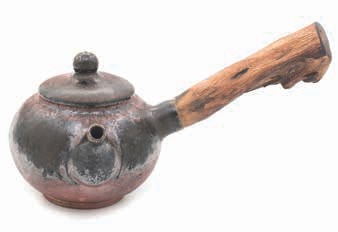
In 2012, Luo Shi's son, Luo Hong Yu (羅弘煜), decided to follow in his father's footsteps and become a potter, learning from both his father and Master Tang. It has been amazing to watch him grow and step into the light as a potter. He continues to work in his father's style, but you can see that the light is being transmitted to the next generation. Though young, Luo Hong Yu has a lot of potential to reach mastery in the future. Recently, we brought a pot of his to the Center as well. It is nice when you find an art or craft you love and see that it has a future in the next generation, so that future Chajin will also be able to enjoy these amazing pots.
When you have known Luo Shi, and his work, as long as I have, it is easy to see how his natural style evolved from the precision of his early sculpted pieces. The same adoration and observation of Nature is present in the work, though the spirit, creativity and conception have all developed to new, more refined and subtle levels. You can still feel him channeling Nature: Instead of sculpting pieces that capture moments of Nature almost photographically, he has moved to bringing the spirit of Nature - Earth, River, Wood and Fire - into his pieces in a more raw, unadulterated and pure form. His sidehandle pots are the perfect match for our sidehandle bowl tea ceremony, bringing Nature and spirit to the tea table and allowing for a simple, natural aesthetic to encourage the healing work of Tea. Beyond that, the fact that his pots are made of local Miaoli clay, fired in the mountains nearby and with handles made of wood that was gathered in the same mountains we hike and drink tea in forges an even deeper bond with his work.
